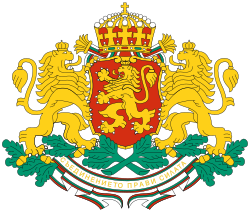Background
The October 2024 elections produced a minority government headed by Prime Minister Rosen Zhelyazkov, comprising GERB–SDS, BSP–OL, and ITN, with APS supporting the government in confidence votes. [2] However, as a result of a ruling by the Bulgarian Supreme Court in March 2025, the Veliche party also gained seats, bringing down the coalition to exactly the minimum 121 seats compared to the 119 seats held by the opposition. [3]
Following DPS–NN leader Delyan Peevski's commitment to support the government in case the recalculation resulted in the loss of the government's majority, APS withdrew from the government in April 2025 because they refused to support a government with Peevski. [4] [5] The government survived a no-confidence vote days later due to Peevski's support, effectively creating a de facto confidence and supply agreement.
In December 2025, the Zhelyazkov Government resigned after weeks of protests against the 2026 budget and corruption within the government. [6] [7]
This page is based on this
Wikipedia article Text is available under the
CC BY-SA 4.0 license; additional terms may apply.
Images, videos and audio are available under their respective licenses.

